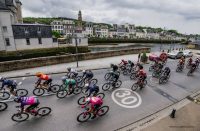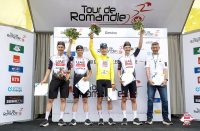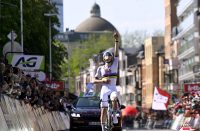This article appeared in the Detroit Free Press. It’s pretty consistent with what I know of cycling in the 90s and what was being said by “people in the know”.
“By Kristen Jordan Shamus Detroit Free Press staff writer
‘In the world of pro cycling in the mid- to late-1990s, Dearborn’s Frankie Andreu was one of George Hincapie’s closest friends. They were both rising stars in the sport, and they rode with the man who would become the top racer of all — Lance Armstrong.
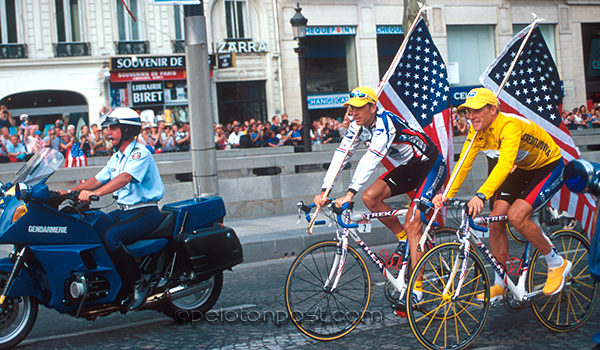
But the doping scandal, which some have called the biggest in professional sports, toppled Armstrong. The fallout that came with it broke many careers, and friendships. Among the casualties was the bond between Andreu and Hincapie, who competed in a record 17 Tours de France.
They were roommates, raced on the same pro cycling teams and, Hincapie says, “we rode for hours and hours and hours” together across the U.S. and Europe.
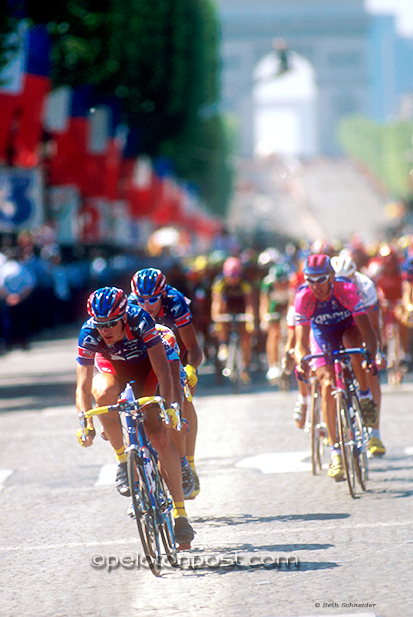
He told the Free Press last week that seeing Andreu with the performance-enhancing drug erythropoietin, or EPO, in his refrigerator for the first time had a big impact on him.
Andreu’s wife, Betsy Andreu, says Hincapie’s allegations are “a futile attempt to not only besmirch their character but also to discredit them.”
Related: The longest ride: Betsy Andreu says faith fueled her fight against doping lies and Lance Armstrong.
“Frankie was my mentor in the peloton,” Hincapie says, referring to the the group of cyclists he rode with. “For me, it was a powerful moment that I won’t forget. It was like, ‘Oh, now I’m going to have to do that, too.’ It’s not like one of those rumors or the whispers you hear. When you actually see it and your good friend is doing it and it’s someone you look up to, it really hits you. Not that I’m blaming Frankie.”
Frankie Andreu told the Free Press he only experimented with EPO, in 1995-96; it wasn’t until 1999 that he used it with any regularity in competition.
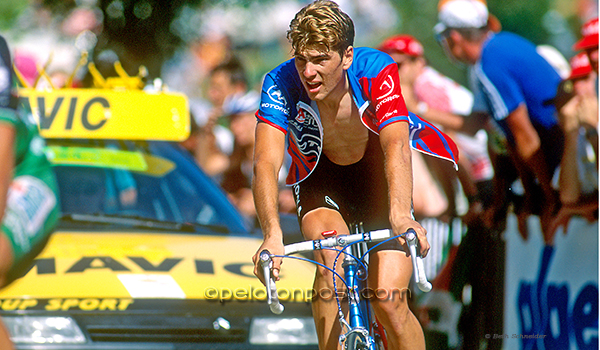
But Hincapie alleges Andreu was more involved than that.
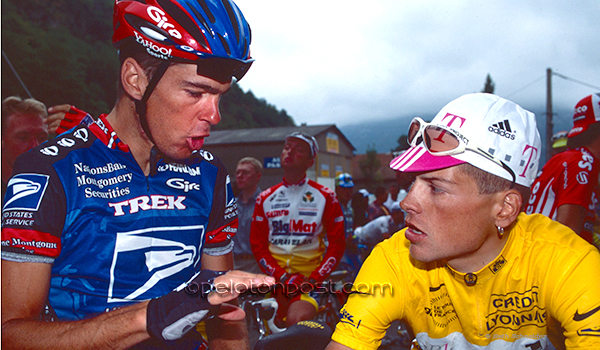
“It was definitely more than experimenting,” Hincapie says, adding that Andreu told him how to buy EPO in Switzerland. Hincapie gave a sworn affidavit about that experience to the U.S. Anti-Doping Agency in 2012.
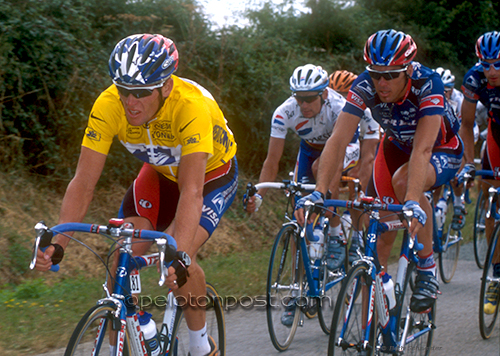
In an interview in a new documentary, “The Armstrong Lie,” which is out on DVD Feb. 11, Hincapie talks about how Andreu taught him how to use EPO in an era when performance-enhancing drugs infiltrated the sport. He told the Free Press that Andreu even told him which pharmacy carried the drug.
At that time, Hincapie says, many cyclists were using some kind of drug to stay competitive.
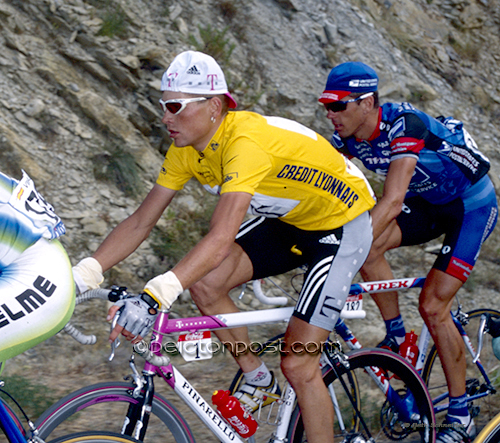
Hincapie, Ullrich racing the 1998 Tour
“I know Frankie was part of the whole system as well,” Hincapie says of doping in the sport. “Once he left cycling, he was very opinionated about the system, as was Betsy. For me, it was hard to accept that. It was hard to understand why he was so opinionated about it when he was part of it.
“I’m not denouncing them because they went through a lot of hard times. But a lot of what actually happened was lost in all this. A lot of what Frankie did, I don’t know if she (Betsy) even knows.”
Both Hincapie and Armstrong have said Frankie never told them that he didn’t want to dope anymore. To the contrary, “he was demanding it” during the ’99 tour, Hincapie says.
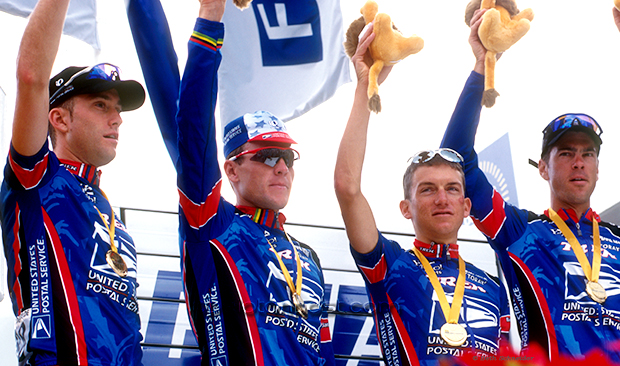
“He said, ‘If these guys are doing it, I need it.’ It was one of these things where he was seeking it out. It’s not like he was told, ‘You have to do this to stay on the team.’ ”
By 2000, Frankie and Betsy say he’d given up on drugs, and he competed clean in the 2000 Tour de France.
Armstrong said in a late January phone interview that he and his manager didn’t fire Frankie from the team after the 2000 tour for refusing to dope. Instead, Armstrong says, it was a dispute over Frankie’s pay that led to his separation from U.S. Postal.
“We’d won the second tour. But we were, even then, on a limited budget,” Armstrong says. “Frankie was making about $150,000 a year. He came to us and said, ‘I have an offer from another team for $300,000.’ … We said, ‘Hey, if you can get 300, you need to take the 300; that’s a great offer.’ ”
But Armstrong’s team manager, Johan Bruyneel, ran into the manager of the team that allegedly offered Frankie the job, Armstrong says. He told Bruyneel there was no $300,000 offer for Frankie on that team.
“Johan got mad,” Armstrong says. “He said, ‘We’re not doing that.’ Frankie thought that when he told us he had another offer, that we’d say, ‘Oh, we need to pay at least $225,000 to keep Frankie Andreu.’ ”
Betsy Andreu says, to the contrary, Frankie got a pay cut for refusing to use performance-enhancing drugs in the 2000 season.
“Others got raises, but his pay got lowered big-time,” Betsy says, adding that was the penalty for refusing to dope. “Frankie said, ‘I can’t do it for this.’ ”
Hincapie says he really doesn’t know what happened, except that he remembers how angry everyone seemed to be.
“I was Frankie’s really good friend, and I never remember him saying, ‘I’m sick of this doping stuff,’ ” Hincapie says. “He wanted to renew his contract, and there was a discrepancy between what he wanted and what the team wanted. He never said, ‘I don’t want to dope anymore.’ ”
After Frankie left the U.S. Postal Service team following the 2000 Tour de France, Hincapie says he and Frankie drifted apart. And it has been hard, Hincapie says, to swallow how outspoken the Andreus have been about doping among other cyclists.
“I don’t wish anything bad upon them,” Hincapie says. “It was just hard for me to accept. Now that the truth is out, everyone knows we were all compliant. We were all part of a screwed-up sport. Just because one of us stopped before the others doesn’t make him a better person.”
Hincapie continued to use performance-enhancing drugs until 2006, when, he says, he stopped doping and rode clean for several more years.
“It was never clear to me why Frankie stopped riding (for U.S. Postal),” Hincapie says. “I would like to sit down sometime with Frankie and try to figure that out. I would like to sit down and try to figure out what happened with all of this … and have a rational conversation.”
Today, Hincapie owns Hotel Domestique in the Blue Ridge Mountains of South Carolina and is in the process of writing a book about his cycling career to be published later this year by Harper Collins.
Armstrong is still embroiled in lawsuits stemming from his doping admission, and has said he’s sorry about using performance-enhancing drugs, and lying about it. He apologized to the Andreus in a phone conversation before his on-air apology last year to Oprah Winfrey.
In an e-mail exchange with the Free Press last weekend, Armstrong, a lifelong Dallas Cowboys fan, referenced an ESPN story about Josh Brent, a Cowboys player who was sentenced to 180 days in jail and 10 years probation for the drunken driving crash that killed his friend and teammate, Jerry Brown.
In the story, Brown’s mother, Stacey Jackson, is quoted as saying: “He’s still responsible, but you can’t go on in life holding a grudge. We all make mistakes.”
Said Armstrong: “Betsy could use a little Stacey Jackson in her life.”

